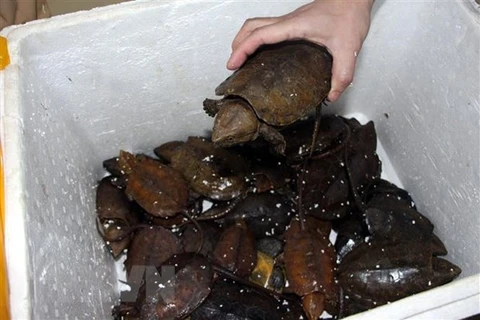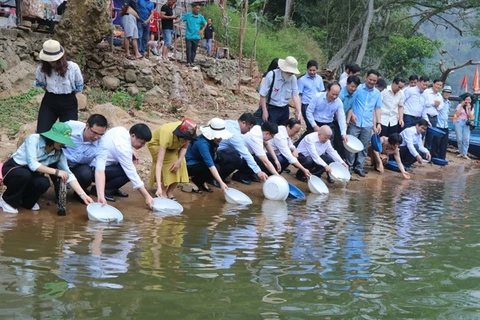Hanoi (VNA) – A trialogue on biodiversity and ecosystem solutions took place in Hanoi on October 4-6, gathering managers, scientists, and representatives of conservation organisations from Vietnam and seven countries, including Cameroon, Colombia, Ethiopia, Kazakhstan, Kenya, Nigeria, Trinidad and Tobago.
Hosted by The Biodiversity and Ecosystem Services Network (BES-Net), this gathering represents the first meeting of all countries under the umbrella of the BES Solutions Fund.
The Trialogue – binging together policy, science and practice communities - will stimulate discussions regarding innovative solutions to enhance the effectiveness and future sustainability of the activities supported by the BES Solution Fund. Discussions will focus on the intertwining contributions of science, policy and practice communities to help protect biodiversity and improve the resilience of ecosystems.
The choice of Vietnam as the host of the Trialogue acknowledges the country’s remarkable efforts to preserve its unique ecological importance.
According to BES-Net, Vietnam, known globally as a biodiversity hotspot, is home to unique ecosystems, including mountains, tropical forests, limestone karst formations, and marine and coastal ecosystems, with over 100 bird species and 10% of the world’s plant species endemic to the country.
 Hoang Thi Thanh Nhan, Deputy Director at the Nature and Biodiversity Conservation Agency under the MoNRE speaks at the event (Photo: VietnamPlus)
Hoang Thi Thanh Nhan, Deputy Director at the Nature and Biodiversity Conservation Agency under the MoNRE speaks at the event (Photo: VietnamPlus)
Between 2017 and 2022, with the support of BES-Net, Vietnam crafted its first national ecosystem assessment report, led by the Ministry of Natural Resources and Environment (MoNRE). The report included organising consultative workshops for domestic and international policymakers, scientists, and practitioners.
Addressing the event, Deputy Resident Representative of the United Nations Development Programme (UNDP) in Vietnam Patrick Haverman emphasised that the Trialogue offers a venue for representatives from BES-Net’s member-countries to share their successes and experiences, as well as exchange ideas and engage in discussions about the future.
“UNDP takes great pride in facilitating not only practical implementation of biodiversity-related solutions but also dialogues among key stakeholders that will likely make a difference,” he said.
Themed “A Crucial Step Towards Global Conservation”, the event is expected to connect the community of policymakers, scientists, and practitioners to jointly assess national efforts, share insights on challenges and opportunities, and jointly develop strategies for cooperation and the scaling up of initiatives.
Participants will discuss the implementation of the Kunming-Montreal Global Biodiversity Framework based on the latest national, regional, and global practices, including a review of research findings released from the Intergovernmental Science-Policy Platform on Biodiversity and Ecosystem Services (IPBES), and strategies for enhancing effective engagement of relevant stakeholders.
 The BES-Net Trialogue gathers managers, scientists, and representatives of Vietnam and eight other countries namely Cameroon, Colombia, Ethiopia, Kazakhstan, Kenya, Nigeria, Trinidad and Tobago. (Photo: VietnamPlus)
The BES-Net Trialogue gathers managers, scientists, and representatives of Vietnam and eight other countries namely Cameroon, Colombia, Ethiopia, Kazakhstan, Kenya, Nigeria, Trinidad and Tobago. (Photo: VietnamPlus) They will also involve in debates on the impacts, challenges, opportunities, and lessons learned from initiatives funded by the BES Solution Fund, which is expected to provide valuable insights for shaping future policies, research, and effective solutions as well as contribute to fostering cooperation and strengthening global commitments to biodiversity conservation.
The BES-Net Trialogue promises to be a transformative event, generating meaningful insights, fostering collaboration, and moving the participating countries one step forward towards actionable strategies to address the pressing issues of biodiversity and ecosystem sustainability.
BES-Net is an initiative led by UNDP, the UN Environment Programme World Conservation Monitoring Centre (UNEP-WCMC) and the UN Educational, Scientific and Cultural Organisation (UNESCO). The initiative has financial support from the Government of the Federal Republic of Germany (through IKI) and Swedbio. It focuses on building capacity for stakeholders through Trialogues that bring together the three BES-Net communities of science, policy and practice in a participatory and constructive dialogue.
Meanwhile, the BES Solution Fund provides catalytic support to implement biodiversity conservation initiatives at the grassroots and local levels in the participating countries./.
























